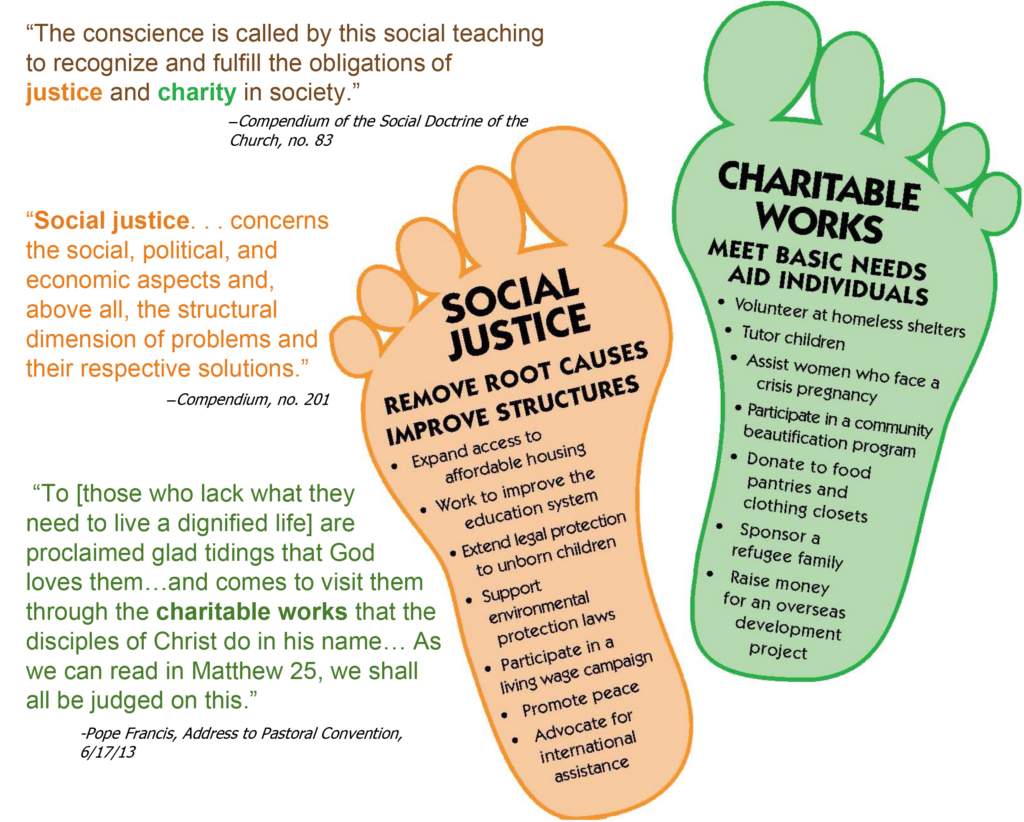Advocacy and Voter Voice
Advocacy is the light that shines through the darkness, revealing the path towards equality, justice, and compassion.
Voter Voice
How Voter Voice Works
If you subscribe, each “Action Alert” email you receive has been researched and authorized by the JPIC Office and advisors, ensuring compliance with Catholic Church teachings. The issues addressed will be current and relevant, as we depend on Catholic Church-led and/or affiliated national and state organizations.
We focus on one issue at a time and share 2-4 Action Alerts each month while Congress is in session. While our main focus is on federal issues, we also advocate at the state level.
Once you subscribe, you’ll get an email for each campaign, regardless of whether you take action. We recommend opening the Voter Voice link for background information. If you agree with our “ask,” you can send the pre-written message, add your own experiences, or edit it as you wish.
Why We Advocate
Catholics are encouraged to use advocacy as a tool for changing existing unjust policies and creating new policies that benefit the common good. When an unjust policy or system is changed because of our advocacy efforts, millions of people win. When we advocate, we put our faith into action.
As Catholics and constituents, we have the responsibility to build relationships with our government representatives. By sharing our experiences and stories, we can advocate for legislation that promotes equity for all.
Many people believe they don’t have a personal story to share, but we all do if we think about our interactions with neighbors, friends, family, and those we encounter regularly. Sharing personal stories is vital for advocacy.
The Three Main Parts of Advocacy
Educating self, others, and legislators
Speaking out
Building relationships
How We Advocate
There are many ways to advocate. You can have conversations with others about issues that are important to you, attend demonstrations, vote in local, state and federal elections, meet with elected officials in person, make phone calls or write letters.
One tool the Sisters of Notre Dame use is Voter Voice. Voter Voice is an online platform that allows for the sending of prepared letters to elected officials. The Justice, Peace and Integrity of Creation National Office (JPIC) of the Sisters of Notre Dame purchases this system for national and state use each year.
The JPIC office watches the legislation going on at the state and federal levels and keep an eye out for specific legislation pertaining to women, children and those on the margins of society. We follow national and local news sources, the Vatican, the United States Conference of Catholic Bishops (USCCB), Justice for Immigrants, Catholic Conference of individual states, Alliance to End Human Trafficking, Catholic Relief Services, Catholic Charities, Catholic Health Association. When we see legislation that would further benefit from Catholic Social Teaching Principles, we prepare an “Action Alert.”
This advocacy is open to all, not just sisters and their associates. The Catechism emphasizes that promoting the common good is everyone’s responsibility. As a community, we must work together to amplify the voices of those in need.
A 2015 survey by the Congressional Management Foundation found that legislators and their staff seek four key areas from constituents:
Information about the impact the bill would have on their district or state
Their constituents’ reasons for supporting or opposing the bill or issue
Hearing a specific
request or ask
Hearing or reading a personal story related to the bill or issue
Catholic Social Teaching Catholic Social Teaching Informs Advocacy
Catholics follow the two feet of love in action. This comes from the long tradition of Catholic Social Teaching (CST), Scripture and Tradition that speaks to the action of love through charitable works and social justice through advocacy. This teaching shares the wisdom of how to care for the needs of the most vulnerable and at the same time build a just society.

Central Themes of Catholic Social Teaching
- The life and dignity of the human person- everything flows from this.
- The call to family, community, and participation
- Rights and Responsibilities. Every person has the right to life and to have their basic needs met. We all have the responsibility to fulfill these rights for each other.
- Option for the Poor and Vulnerable, reflected in Matthew 25, asks us to put the needs of the poor and vulnerable first.
- The Dignity of Work and the Rights of Workers – The economy must serve people, not the other way around.
- Standing in Solidarity with our brothers and sisters regardless of our differences is important to promoting the common good.
- Care for God’s creation
As Catholics, we are part of a community with profound teachings that help us consider challenges in public life, contribute to greater justice and peace for all people, and evaluate policy positions, party platforms, and candidates’ promises and actions in light of the Gospel in order to help build a better world (USCCB).
